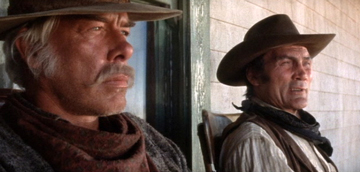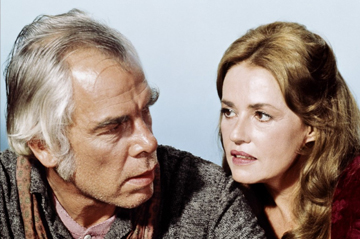
 |
|
|
|
Even before The Wild Bunch there were "elegiac" westerns bemoaning the closing of the West: the encroachment of Eastern civilization on open land and the end of the freedom that the frontier represented. Anthony Mann's Man of the West and Sam Peckinpah's earlier Ride the High Country are obvious examples of this trend, but the same themes can be seen in westerns from the silent days. Just the same, starting perhaps with Tom Gries' Will Penny the screen saw a number of 'sundown' semi-tragedies, tales of cowboys and rodeo stars forced to watch as their way of life becomes extinct. Being downers by nature, most of these pictures weren't exactly popular. The best of the bunch is possibly 1970's Monte Walsh, a beautifully-filmed tale of Montana cowboys driven from their jobs by Eastern investors. Winter cattle-minders Monte Walsh and Chet Rollins (Lee Marvin & Jack Palance) return with the thaw to find that all the local ranches have sold out to a combine. Foreman Cal Brennan (Jim Davis) keeps one spread going as an 'experiment' and the two men are among the few local cowboys allowed to retain their jobs. Relaxed scenes observe ranching life, finding it both demanding and personally rewarding. When he can, Walsh retires to town to visit the French prostitute Martine Bernard (Jeanne Moreau), commonly known as The Countess for her accent. Chet eventually defects to marry a widow (Allyn Ann McLerie) and take up work in her hardware store. Boastful bronc buster Shorty Austin (Mitchell Ryan) accidentally falls in with a pair of cowboys turned criminals (Matt Clark and Billy Bush). With the ranch finally scheduled to fold, Monte travels to the next town, to see where Martine has relocated. A shortage of cowboy customers forces her to wait tables to make a living. A big-time showman offers Monte good pay and star billing if he'll become a performer in a Wild West circus, but he turns the job down with the prophetic words, "I ain't spittin' on my whole life". 
Monte Walsh is the auspicious feature debut of cinematographer William A. Fraker, a Conrad Hall associate who broke out on his own on such distinctive films as Bullitt. Fraker begins with a title sequence showcasing Remington paintings, and many of his vistas of cowboys at work remind us of dramatic artwork of men and horses in motion. Lee Marvin and Jack Palance make an amusing pair of buddies, trading jokes and conspiring with the other cowpokes to give a foul-smelling cook a much needed bath. Palance is especially impressive in his underplaying (!) of many scenes; his Chet is a sweet and inoffensive guy, something Palance doesn't get to play very often. Monte engages in a muted competition with the hotshot Shorty Austin, and offers Shorty traveling money when Cal breaks the news about layoffs. The Eastern owners aren't vilified as villains, just absent speculators who would rather just fence the land in and sit on it while waiting for an improved business climate -- perhaps a raise in beef prices? Fraker lends his scenes a European feel, filming several scenes in lazy one-take mastershots and just letting the characters behave. Relaxing after making love, Martine and Monte smoke cigarettes and exchange a few words; we observe how well they get along and hope they'll be smart enough to go somewhere together and try to make a life for themselves. The movie instead opts for muted tragedy. Rescues don't happen in the nick of time and sick people don't hold out long enough to give loved ones time to rush to their bedside. Monte finds himself undertaking a revenge quest, less to close accounts than to just have something relevant to do. In one impressive action scene, a drunken Monte decides to break a horse at midnight, in the middle of town. The bucking bronco rips up the corral, trashes several buildings and topples the town's water tower. The chaos is staged and filmed very realistically, but it still seems wrong ... after wrecking half the town, nobody shows up to arrest Monte, or even protest. He simply walks away. 
Mama Cass sings the title song, "The Good Times Are Comin'". It's to William Fraker's credit that a movie with so much bad news -- gee, what's so wrong with Monte joining the circus performer and getting rich? -- doesn't leave us with a sick feeling. Quite the contrary, as Monte rides into some kind of future with a positive attitude. Paramount's DVD of Monte Walsh momentarily raises hopes that the studio may be re-embarking on a policy of releasing library titles on DVD. Several years ago Paramount restricted its DVDs to reissues of 'studio classics' and then more or less stopped the altogether. They really haven't embraced Blu-ray for anything but new product. Monte Walsh was originally a Cinema Center Films film release; this disc is actually from CBS TV, as indicated by the several promos for TV compilations at the top of the disc. The 2.35 enhanced transfer is very good and the picture quite beautiful, with an image and soundtrack (with a music score by John Barry) that seem brand new. No extras are included. I remember seeing a giant billboard for Monte Walsh on Sunset Blvd. but can't recall the film staying in theaters very long. After a poorly-distributed horror thriller, A Reflection of Fear Bill Fraker finished his theatrical directing career on the major debacle The Legend of the Lone Ranger. Hardly anybody's gone near the Lone Ranger character since. I met Mr. Fraker when he worked as Steven Spielberg's Director of Photography on 1941. He was a real artist, and didn't let the scale of the production bother him in the least. His crack lighting crew and loyal camera staff worked beautifully together, routinely pulling off elaborate, difficult shots. I can't say I ever saw a take ruined by a camera malfunction.
On a scale of Excellent, Good, Fair, and Poor,
Monte Walsh rates:
Reviews on the Savant main site have additional credits information and are often updated and annotated with reader input and graphics. Also, don't forget the 2010 Savant Wish List. T'was Ever Thus.
Review Staff | About DVD Talk | Newsletter Subscribe | Join DVD Talk Forum |
| ||||||||||||||||||